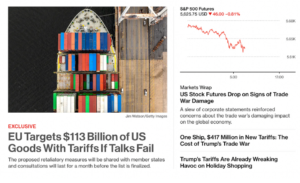“Our obsession with being informed makes it hard to think long-term. We spend hours consuming news because we want to be informed. The problem is, the news doesn’t make us informed – quite the opposite. The more news we consume, the more misinformed we become.” – Shane Parrish, Farnam Street
Jim Simons is the greatest investor you’re never heard of. He pioneered using mathematics to identify and exploit market anomalies. Jim’s hedge fund, Renaissance Technologies, earned annualized returns of ~39% from 1988 to 2018, putting Jim’s fund in rarified air.
One morning, Jim’s trading team huddled in front of the TV. The market was selling off aggressively for no particular reason. The talking heads on CNBC were scrambling to come up with narratives about why the market was selling off.
It turns out one of Renaissance’s traders had “fat fingered” a trade, entering an extra digit on a sell order. This triggered other quantitative traders to sell, creating a cascading avalanche of misguided sell orders.
Jim and his team had a nice laugh as the experts on TV had to explain away an honest trading mistake as some sensational moment.
The lesson? Much of what you read about, watch, and hear from financial media is one interpretation of what’s happening. It likely doesn’t matter.
In Pure Portfolios’ April Market Commentary, I highlighted how many professional investors are shunning financial TV completely. A common theme was if you hear it on mainstream news, it doesn’t matter to financial markets (or it’s already priced in).
“A researcher once ranked the sentiment of news over time and found that media outlets all over the world have become steadily more gloomy over the last sixty years.” – Morgan Housel, author of Psychology of Money and Same as Ever
“News and headlines are 100% noise. Zero signal. Turn off CNBC and Bloomberg, It’s doing you more damage than good.” – Mark McGrath, author of Wealthier: Investment Field Guide for Canadian Millennials
“Consuming more news has become a reliable way to understand less about the world.” – Sahil Bloom, author of The Five Types of Wealth
Why are professional investors turning off media?
Mainstream news, financial or otherwise, is engineered to make you feel worse. Pessimism, fear, and gloom drive engagement (and sell ads), while optimism is often dismissed as unsophisticated and aloof. (see “Intoxicated with Pessimism“).
If a financial expert came on TV and said, “Markets will probably go up over the next 30 years, but they might go down over the near term.”
The above comment is a likely scenario, but the rational guest would never be invited back!
The disconnect between markets and media is the lens in which they look through. Markets are forward looking. They aren’t looking in the rear-view mirror at yesterday’s news. Nor does it wait for the mythical “all clear, no risk to see here” signal before trending higher.
If you’re listening to the people on TV pound the table predicting a recession, catastrophe, and a global trade war, know the market is aware and pricing it in.
The month of April 2025 is a perfect example of the disconnect of media and the nature of financial markets…

Source: Bespoke Investment Group, New York Times
The above graphic is a summation of The New York Times headlines after April 9th. If you were reading dire headlines and couldn’t look at market action, you’d never guess the S&P 500 was up 12% for the remainder of April.
Here is Bloomberg’s home page during April’s historic stock market rally…

Source: Bloomberg
Why do we consume financial media if it leads to sub-optimal investment decisions?
Humans need to feel as if we live in a predictable world. We seek control over outcomes. We turn to the smart-sounding experts on TV to give us the illusion of control. It’s why Wall Street can be wrong year after year in their market predictions, and we keep coming back (see “Tis the Season for Wall Street Forecasting VIII“).
We seek certainty in an uncertain world.
Want to feel better and stick to your long-term investment plan? Turn off the TV. Less CNBC, Fast Money, predictions, and forecasts. More engaging with history.
If you are prone to going down media induced doom loops, we’ve got you covered…
